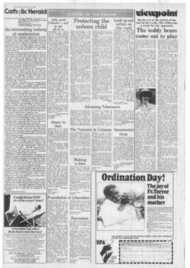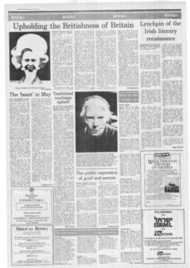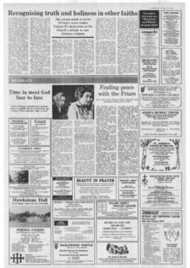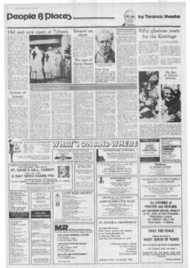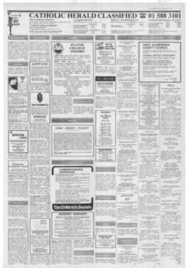Page 3, 21st June 1985
Page 3
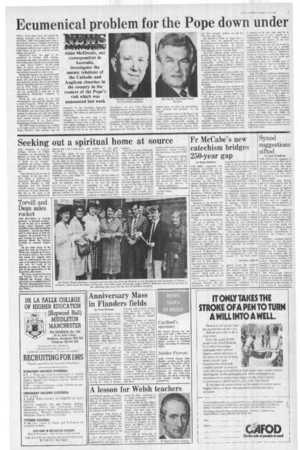
Report an error
Noticed an error on this page?If you've noticed an error in this article please click here to report it.
Tags
Share
Related articles
Women Priests Plea For Pope Down Under
Meeting The New Pro-nuncio
New Code For Unity Dialogue
Pope Edges Spies Out Of Spotlight
Will For Unity Endures
Ecumenical problem for the Pope down under
Alain McElwain, our correspondent in Australia, investigates the uneasy relations of the Catholic and Anglican churches in the country in the context of the Pope's visit which was announced last week WELL, Pope John Paul will indeed be visiting Australia and New Zealand in November, 1986. The indeed comes from a statement by Sydney's Catholic Archbishop Edward Clancy, and it reflects the end of widespread and persistent rumours that the Pope would, in fact, be with us out here during that period.
Practically from the start of his pontificate in October, 1978, bishops, politicians and other Australians, meeting him during trips to Rome, have pressed him to come "Down Under". All he could reply, of course, was that he'd love to come, hoped it would be possible "soon", was looking forward to it and so on.
He has been known, too, to remind some of his urgers, as if to explain why other places were well ahead of Australia in the potential-visits queue, that he had already been to Australia (and New Zealand). This was in 1973. Then, as Cardinal Karol Wojtyla, Archbishop of Krakow, he came this way specifically to take part in the International Eucharistic Congress, in Melbourne.
While he was about it, he was photographed, appropriately enough, with a matey kangaroo. Down the years, the picture has been a godsend to editors seeking a shot of the Pope in unusual pose. The definite news that Pope John Paul was coming to Australia next year was robbed of much of the drama it would normally have created because of a premature announcement in an Australian Broadcasting Commission broadcast.
The ABC broke an embargo on a release to be made jointly a few days later by the Prime Minister, Bob Hawke, and the President of the Australian Episcopal Conference, Archbishop Francis Rush of Brisbane. The conference subsequently was ,called off.
Nevertheless, the news, once it got through, was a source of great joy, as Archbishop Clancy said, to all who have been eagerly awaiting the Pope's visit. "I am sure the visit will be welcomed not only by Catholics but by the vast majority of Australians", he said. "The Pope has established himself on the world scene as a forthright protagonist of justice and peace, along with the other values and ideals of the Gospel.
"I have no doubt the visit will serve to strengthen the faith and commitment of all Christians, whatever tradition they belong to. It will, however, be of special significance for Catholics. We must now, without delay, set about our preparation, both spiritual and material, for his arrival".
The ecumenical value of the Pope's visit to Australia and New Zealand will be, of course, immense, following as it will, Pope John Paul's unforgettable meeting at Canterbury Cathedral with the Archbishop of Canterbury, Dr Robert Runcie, who, incidentally, has just been visiting Australia and New Zealand, pulling out all the Christian unity stops.
But already a cloud, no bigger than a prelate's hand, has appeared over the Australian ecumenical scene. The Anglican Archbishop of Sydney, Dr David Robinson, has hinted he may not attend a joint religious service with the Pope.
Alan Gill, religious affairs writer of the Sydney Morning Herald, points out that if Dr Robinson takes this line, he will be following in the footsteps of his predecessor, Archbishop Sir Marcus Loane, who declined to attend a Sydney Town Hall service with Pope Paul VI when he was in Sydney in 1970.
Archbishop Loanc's decision at that time caused an uproar, says Gill. Many people — including Archbishop Loane — believe it cost him the primacy (which he eventually gained in 1978) of the Anglican Church of Australia.
Archbishop Robinson has expressed his doubts in a column he writes regularly in the monthly diocesan magazine, Southern Cross. He says he is sure the Pope's visit "will bring great satisfaction to all members of the Roman Catholic Church throughout Australia. Perhaps, too, what he will have to say will emphasis those central truths and moral standards of our faith which we have in common; it is very important that we should positively affirm our common Christianity with as much unanimity and mutual charity as we can."
Archbishop Robinson says honesty demands "recognition that the role and authority of the Pope himself is one of the important matters of difference between ourselves and the Roman Communion, and it remains to be seen what may be an appropriate way to show respect to a distinguished church leader without compromising the position of our own church in regard to authority".
Archbishop Robinson says he would be glad to meet the Pope on a suitable occasion should the opportunity arise and should he be invited to do so. "Whether I joined in a service at which the Pope was present would depend on the nature and intention of the service", he says.
"I believe there are suitable ways of expressing what we share in common, as was demonstrated in the service in Canterbury Cathedral at which the Pope was present in 1982".
Alan Gill tells us Archbishop Robinson's attitude to the Papal visit is not unexpected. During the "Loane Affair", and again in 1971, when Archbishop Loane declined to attend the enthronement Mass of Cardinal James Freeman as Catholic Archbishop of Sydney (he retired in 1983), the then Canon Robinson gave background briefings explaining Archbishop Loanc's (and by inference his own) views to the media.
Informed sources (whom God preserve) say Archbishop Robinson's endorsement of the Canterbury Cathedral service, which is shared by Archbishop Loane, is based on a view that was a simple statement of faith, without material considered doctrinally offensve to either side, and, unlike the famous Sydney Town Hall service, was not one at which the Pope was a sponsor.
All that being that, we can again borrow from Archbishop Clancy and get on with preparing a worthy welcome for our worthy Pope John Paul.
blog comments powered by Disqus





